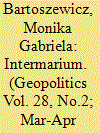| Srl | Item |
| 1 |
ID:
189393


|
|
|
|
|
| Summary/Abstract |
The Three Seas Initiative was launched in 2015 by Croatia and Poland; today, it brings together 12 European states located in the Adriatic, Baltic, and Black Seas basins. To understand the rationale behind this seemingly precarious regional project, this paper employs the optics of critical geopolitics, which shifts the focus away from the exclusive concerns of great powers machinations, counters the dominant narrative by emphasising the multiplicity of voices in the geopolitical spectrum and stresses the emancipatory nature of the whole project balanced by its heterarchical characteristic. This angle allows us to capture the full complexity of this geopolitical design characterised by two phenomena: ‘being in between’ (monolithic powers, areas of domination, or at least domination, one religion and one language) and ‘fragmentation and multinationality’. The analysis demonstrates that Intermarium is an attempt to break away from everything that prevents the region ‘between Berlin and Moscow’ from being a subject, not an object of political affairs, and shows how Central and Eastern Europe fits into the post-liberal international order.
|
|
|
|
|
|
|
|
|
|
|
|
|
|
|
|
| 2 |
ID:
162208


|
|
|
|
|
| Summary/Abstract |
Fluctuations in the volume and the value of financial remittances received from abroad affect the livelihood of households in developing economies across the world. Yet, political scientists have little to say about how changes in remittances, as opposed to the receipt of remittance payments alone, affect recipients’ political attitudes. Relying on a unique four-wave panel study of Kyrgyz citizens between 2010–2013 and a cross-sectional sample of 28 countries in Central Eastern Europe, the Caucasus and Central Asia, we show that when people experience a decrease (increase) in remittances, they become less (more) satisfied about their household economic situation and misattribute responsibility to the incumbent at home. Our findings advance the literature on the political consequences of remittance payments and suggest that far from exclusively being an international risk-sharing mechanism for developing countries, remittances can also drive fluctuations in incumbent approval and compromise rudimentary accountability mechanisms in the developing world.
|
|
|
|
|
|
|
|
|
|
|
|
|
|
|
|